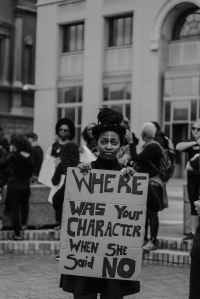Get Your Knees Off Our Necks
Brittney Cooper and Other Black Women Clap Back Against Male-Centered Priorities
Mishpat, a term used over 300 times in the Bible, is about justice - creating protection for those who are most disadvantaged in any society. (Though the term can also mean executing judgment, it is most frequently used as a standard of compassion, according to Tim Mackey of The Bible Project.) In the Biblical text, you would frequently see the list of those people as the orphans, the widows, and the immigrants. With various structures that create challenges to equal payment, education and

housing, this vulnerability is seen in many additional social groups.
For example, the immigrants among us are often disadvantaged, but so are people of color, differently abled people and members of the LGBTQ+ community. When any group, disproportionately, has less access to wealth acquisition (such as lenders refusing loans to Black business owners) then we create additional vulnerabilities. Or, when the application of laws, such as “stand your ground,” create life threatening vulnerabilities for Black people when they do things such as knock on someone’s door, then we create additional vulnerability.

But, not all of the vulnerability is imposed upon the community from outside of it. When we say that "Black Lives Matter" within the African American community, are we really talking about all of the members of our communities, or just able-bodied, heternormative men? And, if others within the community articulate that their lives also matter, how is this received?
As is the case throughout the African Diaspora, African Americans are not a one-issue people. The "Black Lives Matter" campaign is often strictly imagined within the framework of only one type of catastrophic loss. Not only was the African American community silent when Breonna Taylor was killed (because we were in the midst of a pandemic), but when George Floyd was killed, that same pandemic did not prevent tens of thousands of people from marching.
But in addition, issues such as Black women's lack of hygiene products when incarcerated, the increasing Black maternal mortality rate, or the fact that the average Black woman, by retirement, has earned $1M less than her White female counterpart by retirement when all things are equal - these are all urgent matters as well. Why do Black women so frequently stand alone if addressing issues which impact Black women, in particular?
In the following "For Harriet" video, Prof. Brittney Cooper cogently says that, "Black women need to recognize that we keep prioritizing people who do not prioritize us as well." She references the willingness of Black women to head to the front lines to advocate for Black men in justice struggles, only to have the same men often unable to advocate for us. We have identified this as “Blacklash” meaning the backlash from people within Black communities.
We invite you to listen to this thought provoking conversation with a warning that there may be a rare word of profanity used. This engaging conversation includes questions as to why there is a Backlash (or "Blacklash") against Black women who fight for Black women and girls.
By exploring issues of erasure that frustrates the social justice work of Black women, this helps us articulate other important issues. The speakers also explore things such as performative wokeness. For example, if White feminists use the theory of Black women and become self proclaimed “intersectional theorists,” this is a signal that they are “woke” and aware. Yet, as highlighted by Cooper, such words have currency to improve White feminist careers while the same women cannot attenuate the presence, the rage, or the bodies of Black women.
Cooper also mentions her frustration with White women who allow Black women to be assaulted or maligned in meetings but sit silently, then later whisper to us that they agreed with us or thought we were mistreated.
“Whispered allyship is no allyship at all!” says Cooper.
Total agreement.
By exploring the impact of performativity, and current proposals for restoration, such as the "Defund the Police" movement, the women analyze the possible impact this could have upon Black women and girls today. Please listen, like and share with others.
The Misogynoir to Mishpat (M2M) Research Network © 2023


